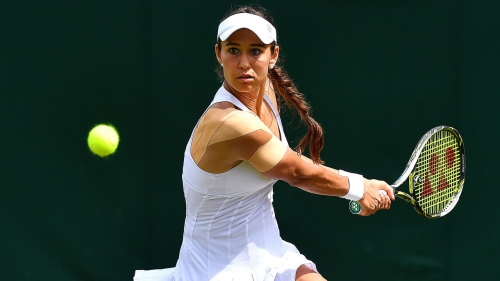
Vitalia Diatchenko plays a backhand in her ladies singles first-round match against Kristina Mladenovic at Wimbledon in 2019.
Mike Hewitt/Getty Images
CNN
—
Poland’s state-owned airline LOT refused to board Russian tennis player Vitalia Diatchenko in line with restrictions introduced following Russia’s invasion of Ukraine, the carrier said in a statement to CNN on Wednesday without naming her.
Diatchenko was denied boarding a LOT flight departing from Cairo on Monday as she was traveling to Calvi in Corsica via Warsaw and Nice to play at a tournament.
The airline confirmed to CNN that it “could not accept a citizen of the Russian Federation on its flight,” citing the restrictions introduced by Poland’s interior ministry during the Covid-19 pandemic and updated in March 2020 following the Ukraine invasion.
“The provisions of the regulation introduce restrictions at certain border crossings, including airport crossings, in relation to citizens of the Russian Federation traveling from outside the Schengen area,” the airline said.
Diatchenko told CNN on Wednesday that she was unable to reach her destination after being denied flying due to her Russian passport and is now back in Moscow.
According to Reuters, the 32-year-old also said she attempted to purchase a ticket from German airline Lufthansa but was advised that she could only enter the Schengen area through Spain which had issued her visa. CNN was not able to independently verify this.
Tennis has been one of the most prominent sports which has continued to welcome Russian and Belarusian athletes at international competitions despite the International Olympic Committee (IOC) executive board’s initial recommendation in February 2022 that they be banned.
But in January 2023, the IOC outlined a multi-step plan for Russian and Belarusian athletes to participate at the upcoming 2024 Summer Games in Paris and the 2026 Winter Games in Milan, which was met by criticism from the United States, Canada and several European countries, including the United Kingdom, Germany and Poland.
According to the latest IOC recommendations released in March, athletes with a Russian or Belarusian passport must compete only as individual neutral athletes, meet all anti-doping requirements while those who support the war or are contracted to military or national security agencies cannot compete.
IOC president Thomas Bach defended the latest recommendations citing tennis as an example that participation of Russian and Belarusian athletes “works” despite the war.
Bach also blasted some European governments as “deplorable” for what he calls their “negative reactions” to the organization’s stance on Russia
